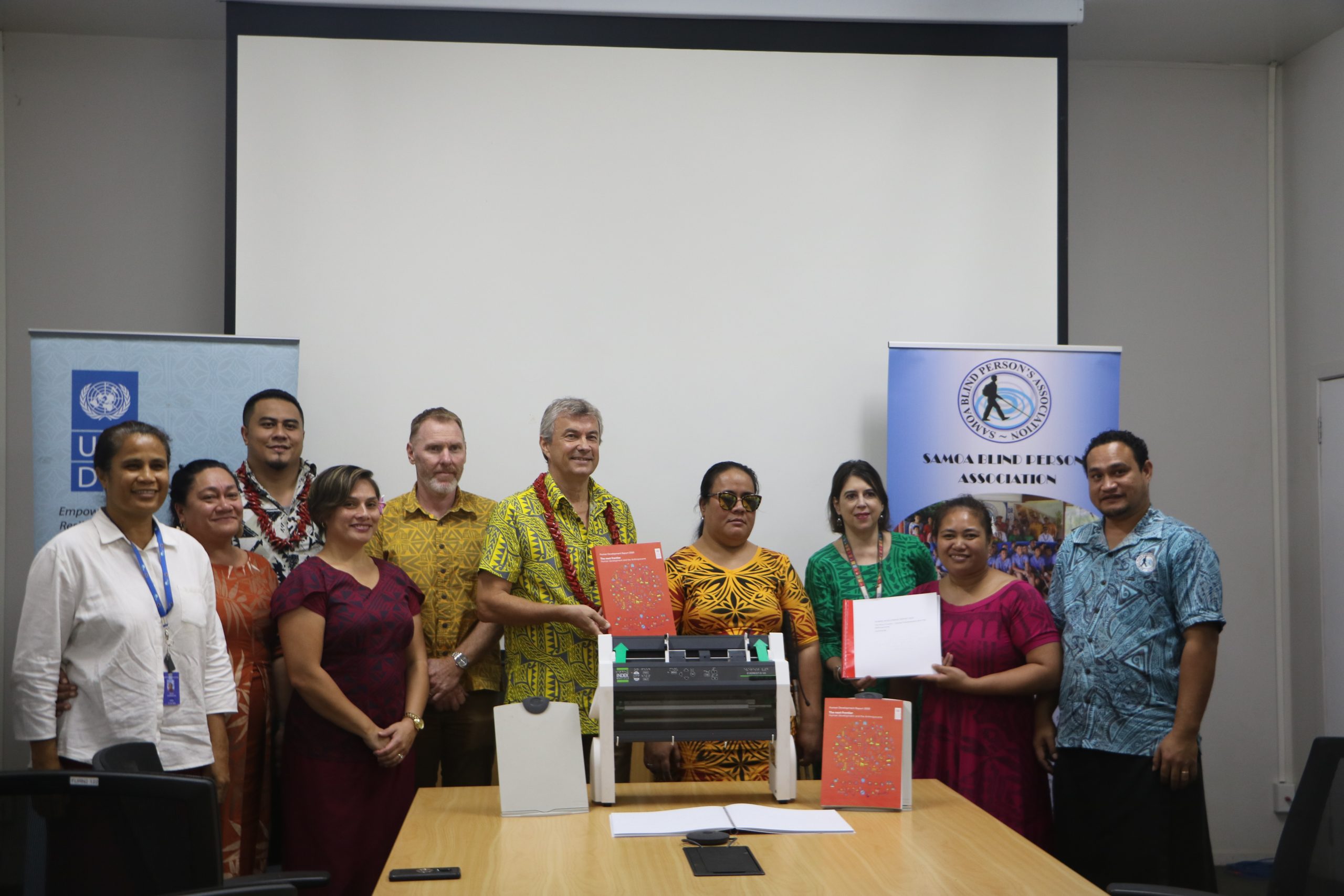The United Nations Development Programme (UNDP) Samoa Multi-Country Office today
joined the global launch of the 2020 Human Development Report by launching the first ever Braille-
translated Report for Samoa. This has been made possible by Braille equipment procured by UNDP, and
handed over to the Samoa Blind Persons Association via the Nuanua o le Alofa (NOLA) organization.
The Braille-translated Human Development Report (HDR) means people in the blind and visually impaired
community in Samoa can read the Report for the first time ever.
“We recognise that persons with disabilities should be at the centre of every effort towards human
development to ensure that we give meaning to the ‘leaving no one behind’ concept. On that note, I
congratulate and thank UNDP and its partners for the valuable donation that we have received. I believe that
this equipment will contribute successfully and meaningfully to our efforts to ensure that persons who are
blind and are visually impaired receive quality and reliable information on an equal basis with others, which is
already happening with this Braille-translated version of the HDR," said Mataafa Faatino Utumapu, General
Manager, NOLA.
UNDP has maintained a good and close partnership with the Disability Community in Samoa with leading
organizations such as NOLA and other Disability Groups and Subgroups like the Blind Persons Association
in delivering development programmes to support Persons with Disabilities, particularly in these challenging
times.
“Our decision to partner with NOLA and the Blind Persons Association as part of our launch event for the
HDR this year, is a reflection of UNDP’s commitment to drive and promote sustainable human development
through an inclusive and human rights-based approach that benefits all and ensures no one is left behind.
At the core of this institutional commitment is the full and equal participation and inclusion of persons with
disabilities in all facets of society as that is instrumental to the achievement of human development, and of
course the SDGs and the 2030 Agenda,” said Jorn Sorensen, UNDP Resident Representative.
This the 30th Anniversary of the Report, published by UNDP since 1990, as independent and analytically
and empirically grounded discussions of major development issues, trends and policies.
This year’s Report is titled: The Next Frontier – Human Development and the Anthropocene. It argues that
as people and planet enter an entirely new geological epoch, the Anthropocene or the Age of Humans, it is
time to for all countries to redesign their paths to progress by fully accounting for the dangerous pressures
humans put on the planet, and dismantle the gross imbalances of power and opportunity that prevent
change.
The report lays out a stark choice for world leaders – take bold steps to reduce the immense pressure that is
being exerted on the environment and the natural world, or humanity’s progress will stall.
“Humans wield more power over the planet than ever before. In the wake of COVID-19, record-breaking
temperatures and spiraling inequality, it is time to use that power to redefine what we mean by progress,
where our carbon and consumption footprints are no longer hidden,” said Achim Steiner, UNDP
Administrator.
“As this report shows, no country in the world has yet achieved very high human development without putting
immense strain on the planet. But we could be the first generation to right this wrong. That is the next frontier
for human development,” he said.
To learn more about the 2020 Human Development report and UNDP’s analysis on the experimental
Planetary Pressures-Adjusted Human Development Index, visit http://hdr.undp.org/en/2020-report
-ENDS-
For media queries, please contact:
Laufaleaina Lesa, UNDP Multi Country Office, Samoa|Tel. +685 23670|E: laufaleaina.lesa@undp.org
www.ws.undp.org @UNDP in Samoa, Cook Islands, Tokelau & Niue @undpsamoa
*****
UNDP is the leading United Nations organization fighting to end the injustice of poverty, inequality,
and climate change. Working with our broad network of experts and partners in 170 countries, we
help nations to build integrated, lasting solutions for people and planet. Learn more at undp.org or
follow at @UNDP.


